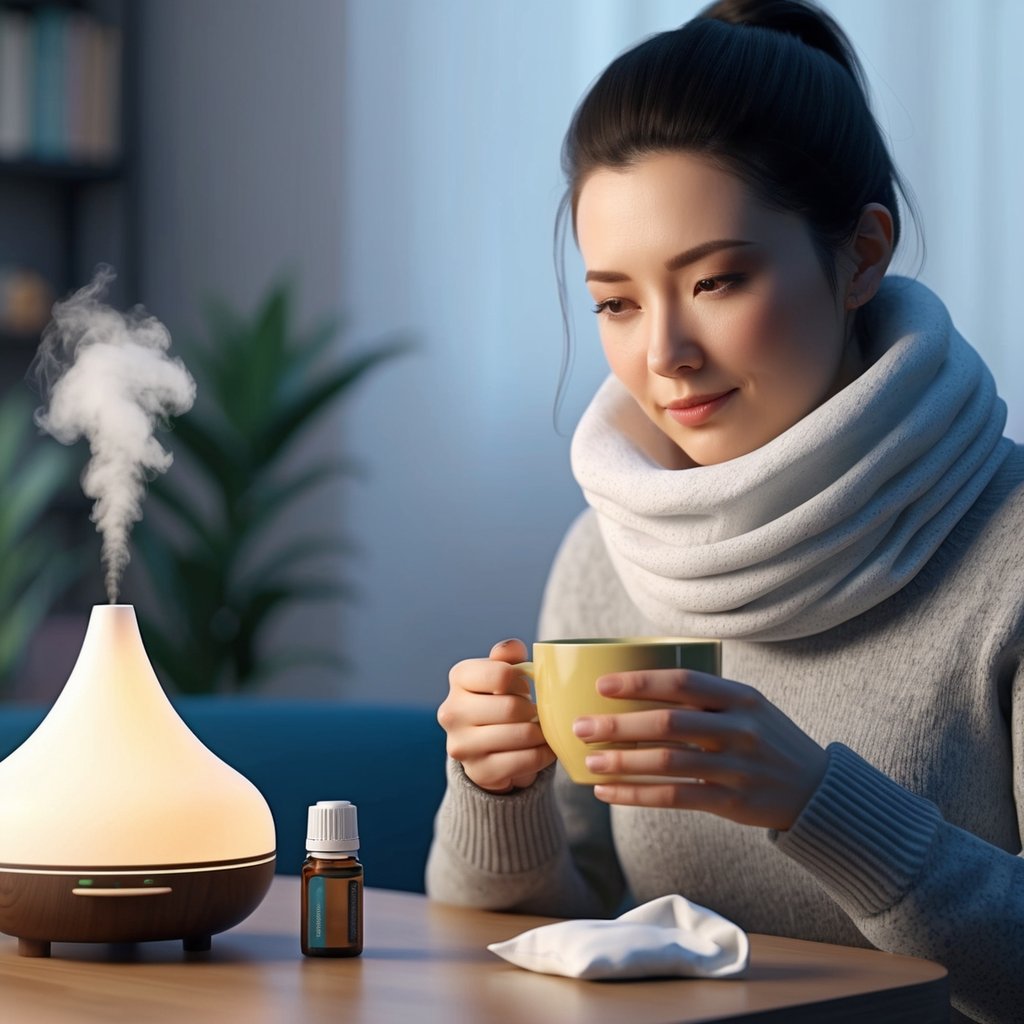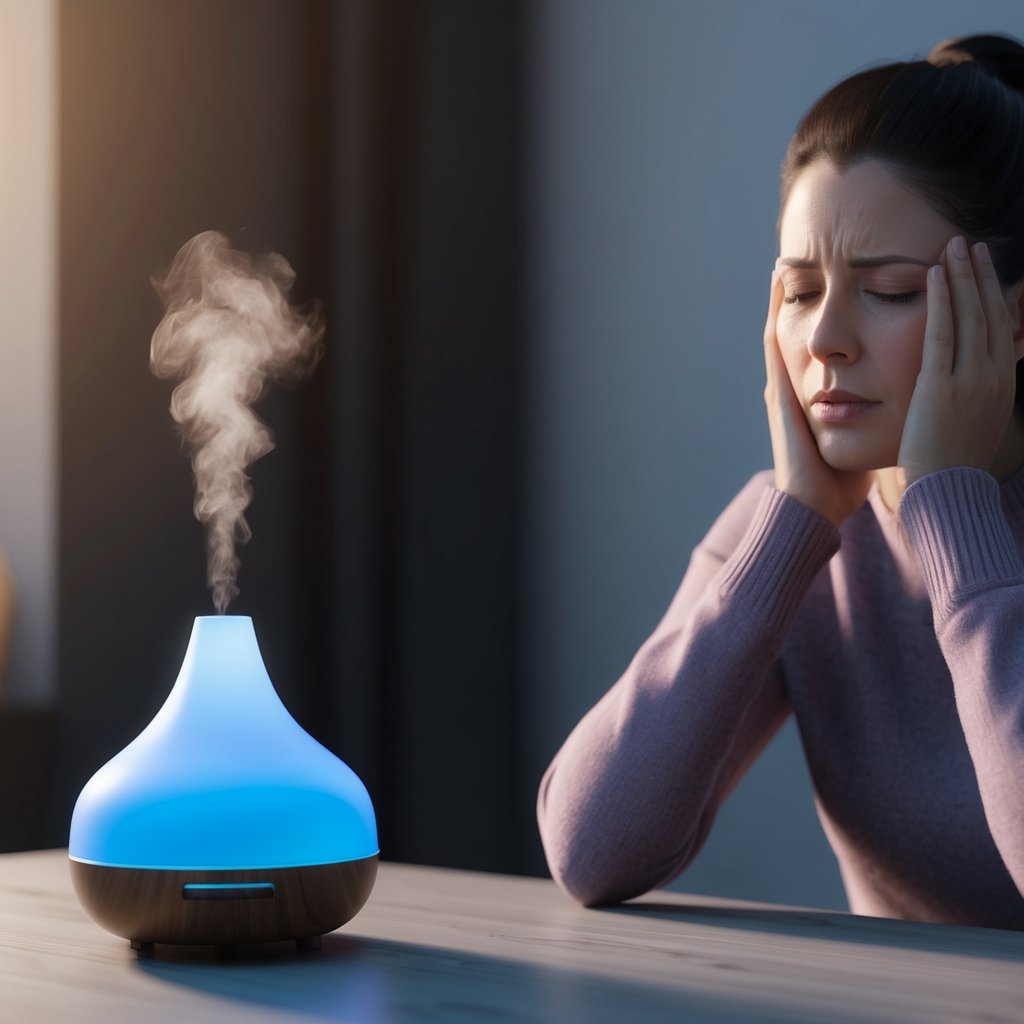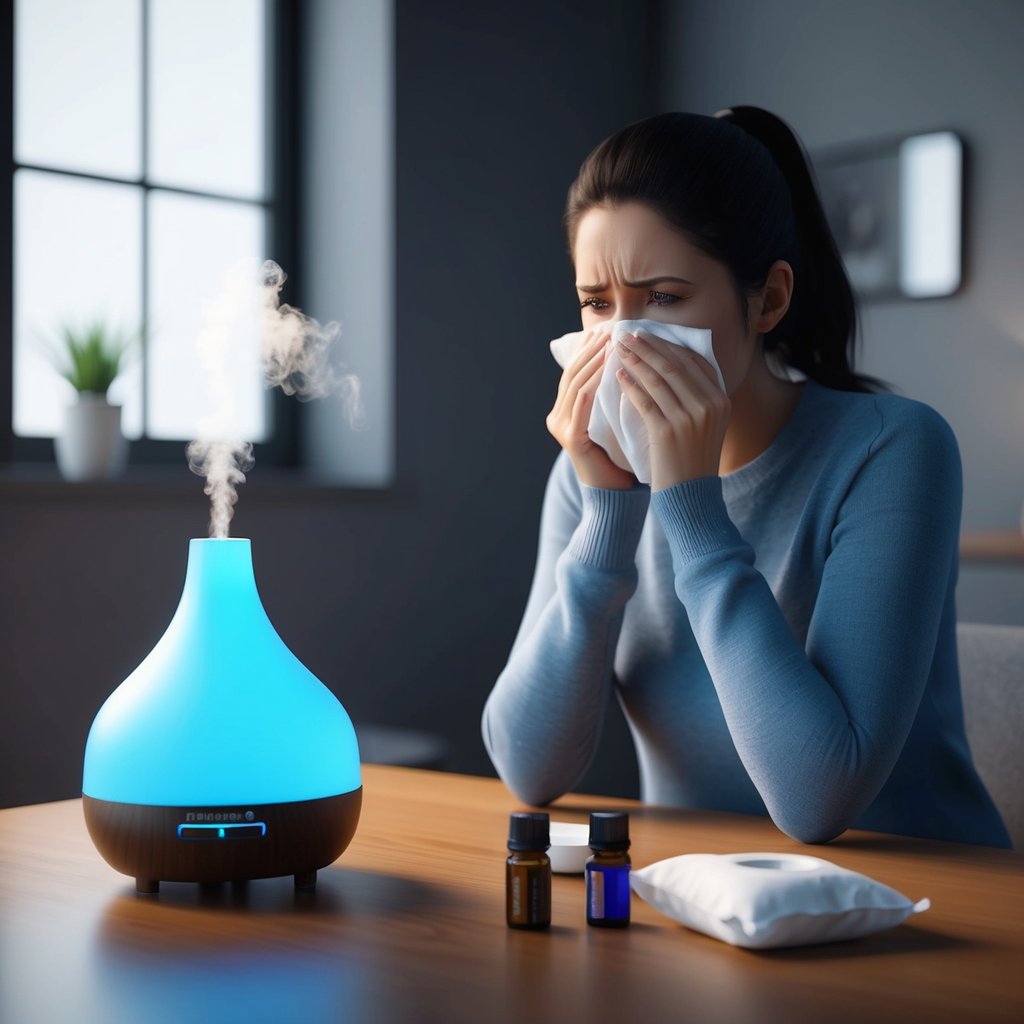Do Essential Oil Diffusers Help with Colds: Quick Facts You Should Know
When you’re feeling under the weather, finding relief from cold symptoms can be a top priority. You might have heard that essential oil diffusers can help with colds by easing symptoms like congestion and improving your overall comfort. Yes, essential oil diffusers can aid in alleviating some cold symptoms by purifying the air and promoting easier breathing.

Essential oils like peppermint, eucalyptus, and lemon are commonly used in diffusers to help with blocked noses and coughs. Their natural properties aim to open up airways and can even uplift your mood, making your recovery a bit more pleasant. Using a diffuser is simple and can be a relaxing addition to your home health remedies.
Exploring how essential oils work against cold symptoms can also be a journey into alternative health practices. While they are not a cure, they can complement your cold treatment plan and make this season a little more bearable.
Key Takeaways
- Essential oil diffusers can ease some cold symptoms.
- Oils like eucalyptus and peppermint are popular for cold relief.
- Using diffusers is a simple, home-friendly remedy.
What Are Essential Oil Diffusers?

Essential oil diffusers are devices that spread the fragrance and benefits of essential oils into the air. You can find different types of diffusers, each with its own way of dispersing the oils.
Types of Essential Oil Diffusers
There are several types of essential oil diffusers you can choose from. Ultrasonic diffusers use water and ultrasonic waves to create a fine mist of essential oils and water. These are popular because they act as both a humidifier and a diffuser.
Nebulizing diffusers use air and oil without water to create a concentrated mist, making them ideal if you want a stronger aroma in your space.
Evaporative diffusers use a fan to blow air through a pad or filter where the essential oil sits, causing it to evaporate quickly. These are simple and don’t require electricity.
Heat diffusers warm the oil to release its aroma into the air. These are often smaller and more affordable, but the heat can sometimes alter the therapeutic properties of the oil.
How Do Diffusers Work?
The way diffusers work depends on their type. Ultrasonic diffusers mix essential oils with water. The device vibrates to break apart the mixture into tiny particles, creating a cool mist.
Nebulizing diffusers don’t require water. They use an air pump to force oil through a nozzle, breaking it into a fine mist of tiny droplets. This allows you to experience the pure scent and benefits of the oils.
Evaporative diffusers let essential oils naturally evaporate into the air. A fan or breeze helps to disperse the scent.
Heat diffusers use warmth to help the essential oils evaporate. This is usually done with a candle or a small electric heater.
Essential Oils and Colds
When you’re fighting a cold, certain essential oils might offer some relief. They can help ease congestion, soothe your throat, or even support your immune system. Here’s a breakdown of oils that are commonly used and their beneficial properties.
Common Essential Oils Used for Colds
Some essential oils are popular for tackling cold symptoms. Eucalyptus oil is well-known for its ability to clear nasal congestion and aid in easier breathing because it’s a powerful decongestant often found in products like Vicks Vapor Rub. Peppermint oil can also be helpful, particularly for opening up airways and providing a cooling sensation that can make you feel more comfortable. Tea tree oil is another option, known for its antimicrobial properties, which might help in reducing cold symptoms.
Lemon oil is often used for its refreshing scent. It is believed to support the immune system because of its high vitamin C content. Lavender oil may help you relax and sleep better, which is crucial when your body is trying to heal. By using these oils in a diffuser, you could potentially create a more comfortable environment when you’re feeling under the weather.
Properties of Essential Oils That May Benefit Colds
Essential oils have certain characteristics that could assist when you’re dealing with a cold. Antimicrobial properties help fight off bacteria and viruses. For example, tea tree oil is praised for this quality. Decongestant properties are important too, as they help open airways. Eucalyptus oil is a standout here.
Immune support can be another key property. Some oils, like lemon, are thought to boost your body’s defenses. Relaxation and sedative benefits are also valuable, as rest can speed up recovery. Lavender oil is often used for its calming effects, helping you get some much-needed sleep. By focusing on these attributes, you can choose oils that align with your needs.
Scientific Evidence
When it comes to essential oils and colds, scientific studies offer some insights. Researchers have explored how these oils might affect your breathing and help manage cold symptoms. Below are findings from studies focused on respiratory health and cold management.
Studies on Essential Oils and Respiratory Health
Research has investigated how essential oils can impact your breathing. Oils like eucalyptus and peppermint are often highlighted. These oils are believed to help with respiratory congestion. Eucalyptus, for example, contains compounds that may help clear blocked sinuses by soothing inflammation.
Some studies suggest that inhaling essential oils might ease nasal congestion. This is because the strong scents may trigger responses in your body that open up airways. However, more research is needed to fully understand how well this works.
Effectiveness of Essential Oils in Cold Management
Essential oils could play a role in managing cold symptoms. Lavender and tea tree oils are frequently discussed for their potential anti-inflammatory and antimicrobial properties. These qualities could help in reducing symptoms like sore throats and congestion.
Limited studies have shown that certain oils might shorten the duration of a cold. For instance, using blends that include lemon oil might support immune function. While some claim benefits, it’s important to note that these oils should not replace conventional cold treatments like rest and fluids. For more information on how essential oils may help with cold symptoms, check out this article on essential oils for colds.
How to Use Essential Oils for Colds

Essential oils can be a comforting way to soothe cold symptoms like congestion and sore throat. Learn how to safely use diffusers and practice effective inhalation techniques for better relief.
Safety Tips for Using Essential Oil Diffusers
When using essential oil diffusers, safety should be your first priority. Make sure to place the diffuser in a well-ventilated area. This helps avoid overwhelming the senses. Always follow the manufacturer’s instructions on how much oil to use.
Be aware of any allergies you might have. Some oils, like eucalyptus or peppermint, can cause skin irritation or allergic reactions. Test a small amount first to see how you respond.
Keep diffusers out of reach of children and pets. This prevents accidents or ingestion of the oils, which can be harmful. If you have health conditions like asthma, consult your healthcare provider before diffusing oils to avoid any adverse effects.
Recommended Practices for Essential Oil Inhalation
Inhalation is a simple way to experience the benefits of essential oils during a cold. You can inhale directly or use a diffuser. To inhale directly, add a few drops of oil to a bowl of hot water. Cover your head with a towel and breathe deeply for a few minutes.
Using a diffuser disperses the oils into the air. This method is gentle and less concentrated than direct inhalation. Try oils like eucalyptus or lavender for clearing airways and calming effects.
Avoid using oils that are too strong or unfamiliar. Stick with those known for respiratory support. Remember to follow proper usage guidelines to make sure you’re getting the most benefits without any side effects.
Alternative Remedies and Complementary Practices
When you’re battling a cold, trying alternative solutions can boost your recovery. Staying hydrated, getting plenty of rest, and adding supplements like Vitamin C can support your body’s healing process.
Hydration and Rest
Keeping your body hydrated is crucial when you have a cold. Drinking plenty of fluids helps thin mucus, making it easier to expel. You can try warm drinks like herbal teas or broths, which can soothe a sore throat and offer comfort.
Rest is just as important. Your body needs more energy to fight off an illness, so getting the recommended amount of sleep can speed up recovery. Make sure your sleep environment is comfortable and free from distractions. Short naps during the day can also be beneficial if you’re feeling extra drained.
Vitamin C and Other Supplements
Adding Vitamin C to your routine might help shorten the duration of a cold. While it’s not a cure, it can support your immune system. You can find Vitamin C in citrus fruits, strawberries, and supplements.
Other supplements, like zinc and echinacea, have gained popularity for their potential cold-fighting benefits. Zinc lozenges are thought to interfere with virus replication. Echinacea might help reduce the severity of symptoms. Always remember to consult a healthcare provider before starting any new supplement, especially if you have other health conditions or take medications.
Potential Risks and Considerations
When using essential oil diffusers, it’s important to be aware of potential risks. Some people might have allergic reactions or respiratory issues, especially if they have asthma.
Allergic Reactions and Sensitivities
Using essential oils can sometimes cause allergies. You might experience sneezing, skin irritation, or headaches. This happens because some oils can cause your body to react strongly. Oils like peppermint or eucalyptus are often involved. If you have never used an oil, test it out carefully.
Put a small amount on your skin first. Wait a few hours to see if there’s a reaction. Also, make sure you’re in a place where you can easily get fresh air. Allergies can be serious, so listen to your body when you try new oils.
Asthma and Other Respiratory Conditions
If you have asthma or breathing problems, you should be extra careful with essential oils. Diffusing oils can irritate your lungs. This could make it harder to breathe. Oils like rosemary or lavender might be risky.
It’s best to use a diffuser in a big, open space. You should also keep windows open for ventilation. Breathing in these oils for too long can be uncomfortable. Try using the diffuser for short periods and pay close attention to how you feel. If you notice discomfort, stop using the diffuser and consult with a doctor.
Conclusion
If you’re wondering whether essential oil diffusers help with colds, they can be a nice addition to your routine. They create a soothing atmosphere and may help with symptoms like congestion and sore throat.
Essential oils like eucalyptus and peppermint can be helpful. They are known for their refreshing and clearing scents. When diffused, they might help open up your airways.
Using a diffuser is simple. Just add water and a few drops of your chosen oil. It’s an easy way to fill the room with calming aromas.
A basic recipe:
- 2 drops of eucalyptus oil
- 2 drops of peppermint oil
- 3 drops of lavender oil
It’s a good idea to follow instructions provided with your diffuser. If you’re not sure which oils to use, try checking this guide.
Remember, while essential oils can be comforting, they’re not a substitute for medical treatment. If you have any health concerns, it’s best to consult with a healthcare professional.
You might find them more helpful when combined with other remedies. Keep your home warm, drink lots of fluids, and rest. Adding an essential oil diffuser can be a simple, enjoyable part of feeling better.
Essential oils are not just for diffusers. You can also use them in a bath or rub them on the skin if they’re properly diluted. They offer a variety of uses, making them a versatile option.
Frequently Asked Questions
Essential oil diffusers can be a comforting tool during colds. You’ll find answers here about the best oil blends, how to use your diffuser effectively, and safety considerations.
What blends of essential oils work best for soothing a cold?
Blends of eucalyptus, peppermint, and lemon are great choices for colds. Eucalyptus helps relieve congestion, while peppermint can soothe sore throats. Lemon adds a refreshing aroma that can lift your spirits. Try mixing a few drops of each in your diffuser.
How can I use my diffuser to help with a cough and sore throat?
To help with a cough and sore throat, use oils like peppermint and tea tree. Peppermint cools and soothes, while tea tree oil has antimicrobial properties that may help you feel better. Diffuse these oils during the day or at night while you sleep.
Are there specific essential oils that are effective against the flu virus?
Some essential oils, like eucalyptus and tea tree, have antiviral properties. They can help support your immune system and alleviate some symptoms of the flu. While they won’t cure the flu, these oils may provide some comfort when diffused regularly during flu season.
Can using an essential oil diffuser improve nasal congestion?
Yes, essential oils like eucalyptus and peppermint are particularly helpful for nasal congestion. They help open airways and reduce stuffiness. Use a diffuser to disperse these oils into the air for easy inhalation, which can bring quick relief.
Is it safe for respiratory health to use essential oil diffusers regularly?
Using essential oil diffusers is generally safe for most people. Make sure the room is well-ventilated and you’re not sensitive to the oils used. If you have asthma or other respiratory conditions, consult with a healthcare professional before regular use.
How does a diffuser aid in relieving symptoms of illness?
Diffusers release essential oils into the air, making it easy to breathe them in. This can help to cool airways, reduce sinus pressure, and provide a calming atmosphere, which may help you rest better when you’re feeling under the weather.

